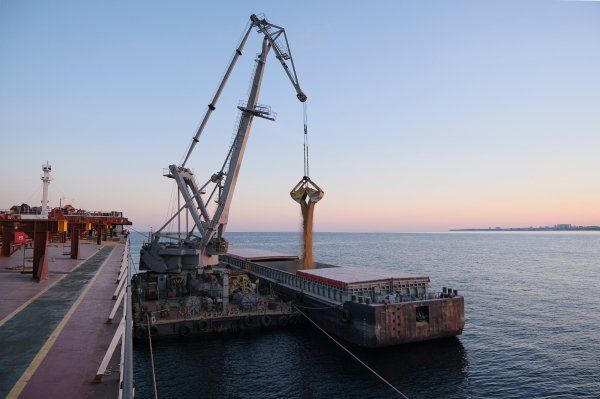Featured Article

May 30, 2024
IL Corn is thrilled to welcome Shelby Barnhart as the Marketing Intern for the summer of 2024. Shelby is a senior at Illinois State University studying International Business and Political Science. Originally from Shelbyville, IL, she has grown up surrounded by all different variations of agriculture throughout her entire life. She hopes to pursue a career in policy and communications. These career goals lead her to find a summer position here at IL Corn. In this position, she will be working with our Marketing and Communications department. This will include projects such as Ag in The Classroom, tabling at local events, and so many more. In her free time, you can find her walking her dog, reading a book, or spending time with her friends and family. When asked what she is most excited about for this position Shelby said, “I’m mostly just excited to maximize on the opportunity to learn from professionals in all kinds varying departments and fields.”

May 30, 2024
IL Corn will be helping our neighbors in Chicago understand how the corn growing in Illinois fields can be a solution to global challenges at the White Sox Run Your Sox Off 5K on June 22. A new running shoe from Saucony’s “Run for Good” sustainability initiative features shoe cushioning made using 55 percent corn-based foam to help limit the dependence on plastic. The shoe will biodegrade more quickly because it is made from renewable materials. Check out Saucony’s Triumph shoe here.

May 30, 2024
As the legislative session adjourned this week, lawmakers in Springfield passed legislation that creates strong regulations for carbon capture and sequestration (CCS) projects in Illinois. IL Corn and the Illinois Renewable Fuels Association (ILRFA) advocated for passage of the bipartisan piece of legislation, SB1289, the SAFE CCS Act, that will help move CCS projects forward safely and responsibly in Illinois while also protecting landowner’s rights. “Having a seat at the table in these discussions is critical for the industry,” Victoria farmer and ICGA President Dave Rylander said. “All sides worked towards compromise in this legislation, which creates an additional regulatory framework around carbon capture and storage technology, CO2 pipelines, and provides landowner protections.” Carbon capture and sequestration is an important opportunity for ethanol plants and corn farmers. The technology allows corn-based ethanol to lower its carbon intensity and qualify for additional clean fuel market opportunities like sustainable aviation fuel. IL Corn and IL RFA thank Gov. Pritzker and bill sponsors Rep. Ann Williams, Sen. Laura Fine, Rep. Jay Hoffman and Sen. Bill Cunningham for their leadership in bringing together the business community, environmental groups, organized labor, and agriculture interests to move this bill forward. The Governor plans to sign the bill into law as soon as possible. Bill Summary The bill affirms that ownership of pore space in rock formations deep below the surface belongs to the surface landowner without severability. Relating to the capture and sequestration of CO2, the bill requires companies to secure at least 75% of the pore space area around sequestration sites before they can petition to initiate the unitization and amalgamation process for the remaining pore space. The number increased to 75% from 71% during early negotiations. The process is administered by the IL Department of Natural Resources, not an eminent domain proceeding. The law also outlines extensive protections for non-consenting landowners. Non-consenting landowners will be paid at least an average amount of the per acre payment consenting landowners are paid for their pore space during injection over the lifetime of the well. The bill requires 30 years of additional post-injection air and soil monitoring at sequestration sites – which goes further than existing federal requirements. It requires companies to have extensive insurance policies to protect landowners and provides funding for local first responders and long-term liability coverage fund. On pipelines, the law includes a CO2 pipeline moratorium until the Pipeline and Hazardous Materials Safety Administration (PHMSA), which is the federal agency responsible for regulating the transportation of carbon dioxide in the US, finalizes updated safety rules for CO2 pipelines OR July 2026, whichever is sooner. Additional Legislative Priority Updates The budget passed with increased funding for the Illinois Department of Agriculture’s Fall Covers for Spring Savings (FCSS) program and continued funding for the National Corn-to-Ethanol Research Center (NCERC) at Southern Illinois University Edwardsville, both were priorities and victories for IL Corn. The FCSS program incentivizes farmers through a $5 per acre crop insurance premium discount to plant cover crops between growing seasons. Over the past several years the program’s demand outpaced available funding with over 40,000 acres unable to participate in the program in 2023. Through a successful lobbying effort from IL Corn, Illinois Soybean Association, Illinois Farm Bureau (IFB), and American Farmland Trust, the program received an additional $300,000 in funding this year bringing the funding amount total to $960,000 up from $660,000. The increased funding moves us one step closer to achieving our goal of enrolling 500,000 acres in the program. In addition to FCSS, the budget maintained NCERC’s current funding levels at $1 million. Funding for the 20-year national research center dedicated to biofuels, biochemicals and bioproducts ensures that NCERC will continue to remain on the cutting edge of technology research and development. Also, during the legislative session, IL Corn worked with a broad coalition of opponents to stop SB771 from progressing in the Senate and House. SB771 granted the Illinois Department of Natural Resources broad regulatory oversight over Illinois wetlands and small streams, which are already regulated under the Federal government’s “Waters of the United States” ruling. As currently written, IL Corn opposes SB771 and will continue to advocate for a seat at the negotiating table to ensure that agriculture concerns are addressed in future legislation. Finally, over the past several years, IL Corn has seen many bills introduced in the General Assembly that would adopt California emission standards in Illinois. We have opposed these bills with other industry groups that would be detrimental to our state’s overall economy and negatively impact our renewable fuels industry. Our team took a different approach this year and instead proactively worked to draft a Clean Fuel Standard in Illinois that would benefit farmers and the renewable fuels industry. We worked with Sen. Dave Koehler on SB1556, which is legislation that allows renewable fuels to help reduce carbon emissions in the transportation sector. IL Corn and IFB worked closely with legislators to draft workable language that included several changes such as requiring the use of the GREET model for calculating carbon intensity and ensuring that farmers were fairly compensated for their voluntary on-farm agriculture practices that benefit soil health and water quality. Over the next several months, prior to veto session, we will continue to work with legislators and stakeholders to ensure that SB1556 conversations progress and our team always has a seat at the negotiating table.

May 29, 2024
Earlier this week, the Illinois Corn Growers Association (ICGA) and four other state commodity organizations called on Illinois’s congressional delegation to grow export opportunities and protect agricultural trade from undue retaliation. The Biden Administration recently increased tariff (import tax) rates on goods like Chinese steel and aluminum, as well as high technology components like semiconductors.These tariffs were initially implemented during the Trump presidency. “Both Presidential candidates and party platforms support proposals to raise tariffs on imports, such as steel and high-tech components, which are a cause for concern,” the letter said. “These tariffs, essentially regressive taxes, will be borne by U.S. consumers, including farmers who purchase equipment made from steel and high-tech controls,” Not only will United States consumers pay more, our trade partners may raise their own tariffs on U.S. goods in retaliation. Farmers were recently caught in the crosshairs of internation trade policy trade during the trade war between the U.S. and China. The United States Department of Agriculture’s Economic Research Service (ERS) reported $30.4 billion in agricultural products were lost as China retaliated to 2018 U.S. steel and aluminum tariffs. In March, ICGA supported the National Corn Growers Association’s Consensus of Congress “encouraging federal officials to pursue trade opportunities and invest in foreign market development to ensure that the U.S. remains a global leader in corn production and trade.” The United States Economic Research Service estimated 1.13 million non-farm jobs were depended on agricultural exports. As presidential and congressional elections approach, IL Corn Director of Exports and Logistics Collin Waters said American farmers need export opportunities to ensure demand. “The farm economy outlook is not good this year due to low commodity prices and high input costs. We cannot afford to lose any export markets now, so we’ve asked Congress to help ensure that farmers won’t be retaliated against. We’ve also asked Congress to help us pursue a more ambitious trade agenda that will increase foreign market access and benefit farmers for years to come,” Watters said. “The unified voice from these Illinois agriculture groups speaks volumes,” Illinois Farm Bureau Director of National Legislation Ryan Whitehouse said.“Our farmers need policies that grow their markets, not shrink. They need more trade opportunities, not less.” In addition to ICGA and IFB, the letter included support from the Illinois Beef Association, the Illinois Pork Producer Association, and the Illinois Soybean Association. ICGA continues to advocate for expanding export market opportunities across administrations.

May 28, 2024
FOR IMMEDIATE RELEASE Contact: Lindsay Croke May 28, 2024 (309) 846-6622 Carbon Capture Law Delivers Opportunity for Ethanol & Protects Landowners BLOOMINGTON, Ill. – IL Corn Growers Association (ICGA) and the Illinois Renewable Fuels Association (ILRFA) appreciate passage of SB1289, the SAFE CCS Act through the state legislature. The bipartisan legislation helps move carbon capture and sequestration (CCS) technology projects forward safely and responsibly in Illinois.

By Irshad MD
•
May 24, 2024
BLOOMINGTON, Ill. – Today, upon hearing that the House Agriculture Committee passed a farm bill late yesterday, IL Corn Growers Association (ICGA) President Dave Rylander, a farmer from Victoria, IL, issued the following statement: “Illinois corn farmers need a farm bill that will provide a safety net to keep farms and farm families in business. While we are grateful for the time and consideration that our elected officials and staff invested in the proposal that passed the House Ag Committee late yesterday, ICGA has major concerns. “Primarily, the bill is not strongly bipartisan; bipartisanship and compromise are what Illinois farmers need to pass the best possible farm bill. We also need the best possible policy that propels agriculture forward and does not disparage or divide us based on regional or state lines.

May 23, 2024
This week, the U.S. Grains Council received notice of additional funding from the U.S. Department of Agriculture under its Regional Agriculture Promotion Program (RAPP). The award will disperse $17 million to USGC for use in developing markets that will build U.S. agriculture exports. “The U.S. Grains Council is IL Corn’s most important partner when we think about growing international markets for corn and corn products like ethanol,” said Mark Wilson, USGC Secretary-Treasurer and farmer from Toulon. “This additional funding from the USDA will bolster the Council’s ability to build relationships and capitalize on opportunities to bring U.S. agricultural products to new areas that show potential for export growth.” RAPP was launched after a request from the U.S. Senate Committee on Agriculture, Nutrition, and Forestry to bolster, diversify, and expand market opportunities for U.S. agriculture products. This round of funding is the first of five tranches, with the next coming in 2026. The majority of the Council’s RAPP funding will be used to enhance its programming in Africa, Latin America, the Middle East, South and Southeast Asia, where rapid population and economic growth is creating demand for high-quality agriculture products that the U.S. industry will be positioned to meet. Other portions of the investment will be committed to solidifying U.S. producers’ stances in existing top export markets and to add staff in the Council’s Washington, D.C. headquarters to properly manage and administer the Council’s higher international activity. “RAPP funding is a game changer for the Council and other cooperators representing U.S. products in international markets and will allow a significant expansion of the great work that Council staff are already doing worldwide,” said Ryan LeGrand, USGC president and CEO. “Thank you to USDA for its constant support of the Council and for recognizing the need to continue improving U.S. export market promotion efforts.” The Illinois Corn Checkoff is an important funding partner of the U.S. Grains Council. Two Illinois corn farmers sit on the USGC Board of Directors, and many other farmer leaders participate in yearly meetings to direct USGC export programs. Together, we work to develop markets, enable trade, and improve lives.

May 23, 2024
Illinois agriculture worked together this week magnifying farmer voices on a collection of topics. 1. Supporting the Livestock Industry Farmer led organizations signed a letter supporting language in the House’s farm bill that prevents a segmented marketplace for livestock producers. The legislation challenges California’s infamous Proposition 12 and reinstates market certainty for Illinois farmers. Proposition 12 impacts the Illinois pork industry which supports nearly 34,000 jobs and contributes $3.3 billion to the economy. 2. Support for a Bipartisan farm bill The IL Corn Growers Association (ICGA) and the Illinois Soybean Association penned a letter to some members of the House Committee on Agriculture requesting a bipartisan, honest farm bill . The letter highlighted the legislation’s additional funding for market development and crop insurance coverage. However, it raised questions on additions to Title I made at the expense of the Supplemental Nutrition Assistance Program (SNAP). “While our top priority is protecting crop insurance, our second is a bipartisan farm bill. We are encouraged by proposals that increase trade program funding and guarantees for ARC. However, we cannot overlook the funding mechanism in the House proposal that undermines SNAP programs Americans rely on and creates a clear partisan divide,” said the letter. “As an industry and state, it is important we stand alongside and support each other,” ICGA President Dave Rylander said. “As the farm bill and other policies progress, we will continue to work together on issues impacting our memberships.”
Articles
2026
2025
2024
2023
2022
2021
2020

